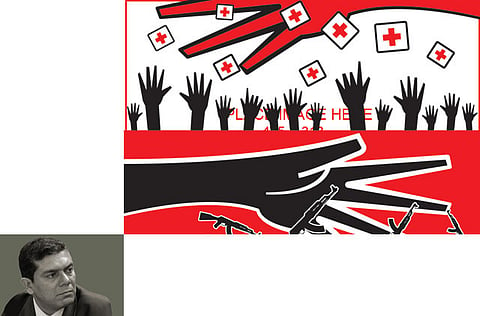Radicals gaining a foothold in Syria
Growing influence of Jabhat Al Nusra is a worry for Washington and its allies

John Kerry’s first overseas trip as US secretary of state has underlined a possible shift in Washington’s stand on one key regional issue: Syria. Kerry announced that the US will deliver $60 million (Dh220.2 million) worth of medical and humanitarian assistance to the “moderate” wing of the armed Syrian opposition, while making it clear that the Obama administration will not provide weapons to the rebels.
In deliberations with his Saudi counterpart, Prince Saud Al Faisal, Kerry also said that “There is a very clear ability now in the Syrian opposition to make certain that what goes to the moderate, legitimate opposition is, in fact, getting to them, and the indication is that they are increasing their pressure as a result of that.”
What this means is that Washington and its anti-Damascus allies (Europe, Turkey, Saudi Arabia and Qatar) will now channel aid and even arms to support the Free Syrian Army (FSA) in its struggle to gain the upper hand in the two-year-old crisis.
Until recently the US had called on its allies not to supply arms to Syria’s rebels for fear that they will fall in the wrong hands. In particular, Washington is wary of the growing influence of radical groups fighting against the regime of President Bashar Al Assad. One such group, Jabhat Al Nusra, has been listed as a terrorist organisation by Washington, allegedly for its close links to Al Qaida.
But what Kerry’s trip has unfolded is a new perception of the military balance within the rebel groups. Arms and other assistance will be delivered to the recently restructured FSA in its fight to take control of Syrian cities and towns. The West would like to see the FSA, an umbrella for myriad rebel groups, having the last word in the military sense at the expense of militant groups. But Brigadier General Salim Idris, the head of the FSA’s military command, has complained that until recently not even a bullet was sent to his men.
Jabhat Al Nusra is the most prominent among several militant groups now active in Syria. It is comprised of Syrian and Arab fighters, many of whom had come from Iraq. Numbering anywhere between 1,000 to 5,000 members, they are believed to have access to sophisticated weapons and have a good command structure reflecting their previous experience in Iraq and Libya.
They are active in the north and east of the country and while they act independently from the FSA, they have claimed major victories against the regime especially in Aleppo, Hama and Idlib. Last year they announced that their objective was to establish an Islamist emirate in Syria.
Last week, it was reported that Jabhat Al Nusra was able to overrun Al Riqqa city, but was believed to have lost control over some parts of Aleppo. Israeli sources warned that the radical group had also taken over a Scud missile base not far from the Israeli-Syrian border. Two weeks ago the group claimed responsibility for a car bomb explosion in downtown Damascus.
Stemming the growing influence of Jabhat Al Nusra has now become a strategic aim of Washington and its allies. Last week, it was revealed that the FSA has received a shipment of anti-tank missiles and other armaments that was purchased by Saudi Arabia and delivered through Jordan. The New York Times reported that the CIA was running a covert operation in Jordan to train Syrian rebels.
All of this is taking place when hope for a political settlement is waning. Efforts by the Syrian National Coalition (SNC) to start a dialogue with the regime have been rebuffed. Moscow and Tehran remain Al Assad’s closest allies and both are supplying him with fresh weapons.
Washington and Moscow support a political settlement but disagree on the fate of Al Assad. For now attention is focused on the warfront: The regime still believes it can defeat the rebels while the opposition says it has no alternative but to continue the fight.
In fact, fighting has intensified in the past few days with Syrian rebels bolstering their hold on districts close to the capital Damascus, and the regime firing Scud missiles into Aleppo and Idlib causing massive destruction and civilian casualty. This probably explains the recent surge in the number of Syrian refugees, which the UN now estimates at one million.
Backing the moderate wing of the armed opposition is now the main objective of Washington and its allies. This could become the precursor for bloody confrontations among the rebels themselves. The race to Damascus is now on between the FSA and other groups. It’s also possible that Washington and Moscow could come to an understanding on the issue of weakening the extremists and making sure that they don’t emerge as winners in the end.
A bitter fight between the FSA and radical groups could soon materialise in Syria. The danger of a spillover has increased in the past few days involving Lebanon and Iraq. It could be the beginning of another bloody chapter in the Syrian crisis.
Al Assad had warned that his fall will empower the radicals. On this point, at least, it appears that he was right.
Osama Al Sharif is a journalist and political commentator based in Amman.
Sign up for the Daily Briefing
Get the latest news and updates straight to your inbox



